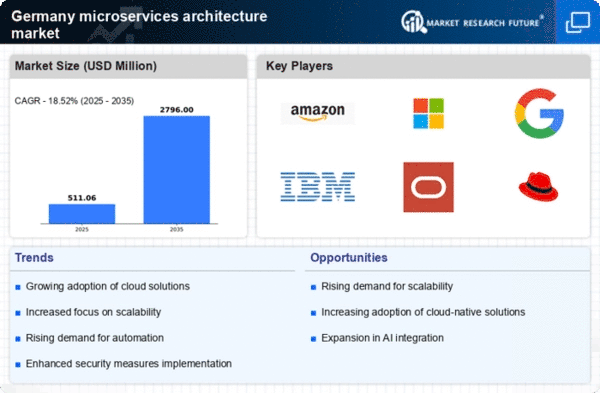Growing Demand for Scalability
The microservices architecture market in Germany is experiencing a notable surge in demand for scalability solutions. As businesses increasingly seek to enhance their operational efficiency, the ability to scale applications seamlessly becomes paramount. This architecture allows organizations to deploy services independently, facilitating rapid scaling in response to fluctuating user demands. According to recent data, approximately 70% of enterprises in Germany are prioritizing scalable solutions to support their digital transformation initiatives. This trend indicates a robust growth trajectory for the microservices architecture market, as companies recognize the necessity of adapting to changing market conditions and customer expectations.
Enhanced Agility in Development Processes
In the context of the microservices architecture market, agility in development processes is becoming a critical driver for organizations in Germany. The modular nature of microservices enables development teams to work concurrently on different components, significantly reducing time-to-market for new features and updates. This agility is particularly vital in industries such as finance and e-commerce, where rapid innovation is essential for maintaining competitive advantage. Recent surveys suggest that 65% of German companies are adopting microservices to enhance their development agility, thereby fostering a more responsive and adaptive business environment.
Cost Efficiency through Resource Optimization
Cost efficiency is emerging as a significant driver within the microservices architecture market in Germany. By leveraging microservices, organizations can optimize resource allocation and reduce operational costs. This architecture allows for the deployment of only the necessary services, minimizing waste and enhancing overall efficiency. Reports indicate that companies utilizing microservices have observed a reduction in infrastructure costs by up to 30%. As businesses strive to improve their bottom line, the microservices architecture market is likely to see increased adoption as a means to achieve sustainable cost savings.
Increased Focus on Customer-Centric Solutions
In the microservices architecture market, there is an increasing focus on developing customer-centric solutions among businesses in Germany. Organizations are recognizing the importance of tailoring their services to meet specific customer needs, which microservices facilitate through their modular design. This architecture allows for the rapid iteration and deployment of features based on customer feedback. Recent studies indicate that 75% of companies in Germany are prioritizing customer-centric approaches, driving the demand for microservices as a means to enhance user experience and satisfaction. This trend is likely to continue shaping the market landscape.
Rising Need for Continuous Integration and Delivery
The microservices architecture market is being propelled by the rising need for continuous integration and delivery (CI/CD) practices among German enterprises. As organizations aim to streamline their software development lifecycle, the microservices approach facilitates automated testing and deployment processes. This capability is crucial for maintaining high-quality software while accelerating release cycles. Data shows that approximately 60% of German firms are implementing CI/CD pipelines, which directly correlates with the adoption of microservices. This trend underscores the importance of microservices in enabling organizations to remain competitive in a fast-paced digital landscape.
















